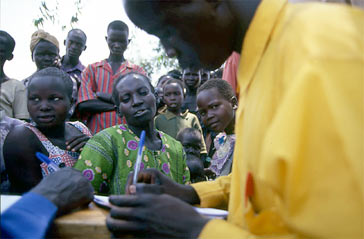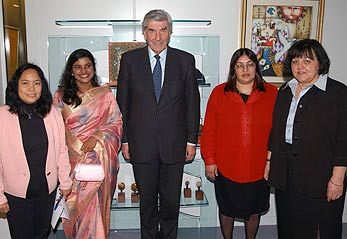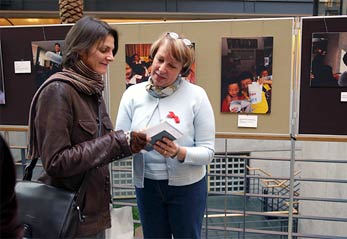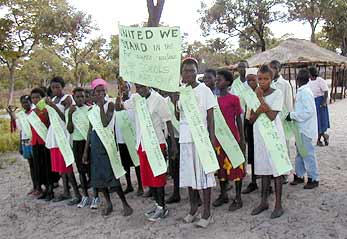Afghan returns top 1 million mark
Afghan returns top 1 million mark
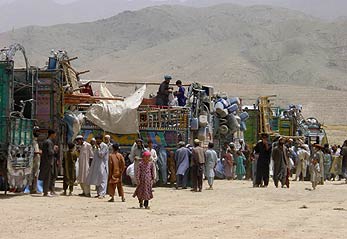
GENEVA, June 17 (UNHCR) - The number of Afghans going home topped the 1 million mark today and UN High Commissioner for Refugees Ruud Lubbers pressed his plea to the international community to provide urgently-needed support to ensure their return would be sustainable.
"We've surpassed the 1 million mark, and now expect that up to 2 million Afghans could return home this year," Lubbers said. "Fresh contributions of funds and food aid are urgently needed. The new government of President Karzai urgently needs international support. The Afghan people require a smooth and rapid transition from relief to development to ensure they have jobs and don't find themselves in deeper poverty."
The number of returnees has been largest from neighbouring Pakistan, with 920,000 Afghans going home. More than 75,000 people have already repatriated from Iran in an operation that began in April. Another 9,000 Afghans have returned from Central Asian states.
When the Afghan authorities and UNHCR started the assisted return effort on March 1, they planned for 800,000 refugees to repatriate from outside the country, and for another 400,000 internally displaced people to be transported back to their home villages inside Afghanistan.
But the current pace of return has exceeded the expectations of relief agencies. The refugees' enthusiasm to go back has created a new danger that Afghanistan could slip backwards unless relief agencies immediately receive needed funds to help Afghans rebuild their homeland. Afghanistan has been suffering from grinding poverty, widespread drought and the effects of decades of war.
UNHCR still requires more than $86 million dollars for its $271-million aid operation in Afghanistan and in neighbouring states hosting the world's largest refugee group.
Filippo Grandi, the Kabul-based head of UNHCR's Afghan operations, told reporters at the Pul-i-Charkhi returnee centre on Sunday that if larger reconstruction programmes do not begin quickly in Afghanistan, the returns could be in jeopardy.
"The UNHCR operation, which is very large operation, is only funded to the tune of 60 to 65 per cent," Grandi said. "We are already almost at mid-year, this is the season where we spend most of the money to buy building materials and to pay the travel cost of the returnees. If we don't receive fresh contributions, we are running out of money in a few weeks and we will have to stop this operation."
At the beginning of the year, there were more than 3.7 million Afghan refugees outside the country, and another 900,000 displaced persons inside Afghanistan. In addition to the 1 million assisted returns in less than four months, UNHCR estimates that more than 200,000 refugees have spontaneously repatriated since the Taliban fled. Another 160,000 internally displaced people have also been helped home by UNHCR and the International Organization for Migration, while some 400,000 have gone back independently.
The Afghans' return has already surpassed the massive repatriation to Kosovo of mid-1999, and should soon pass the return of 1.5 million Iraqi Kurds in 1991.
Afghans going back under the UNHCR/Afghan government initiative get a family kit containing various items like blankets, plastic tarpaulins, buckets, tools and other supplies. In some areas, the U.N. refugee agency has been forced to substitute items due to shortages. A lack of funds also means that UNHCR has had to cut back on its shelter kits, which it hopes to distribute to up to 96,000 families this year to help them rebuild their homes.
The U.N. World Food Programme, which provides returnees with a three-month supply of wheat flour, has run dangerously low of supplies. Many returnees only receive 50 kilogrammes of flour, a third of the planned ration, while people returning to southern Afghanistan currently get nothing. Families that don't get food receive vouchers so they may collect supplies later.


